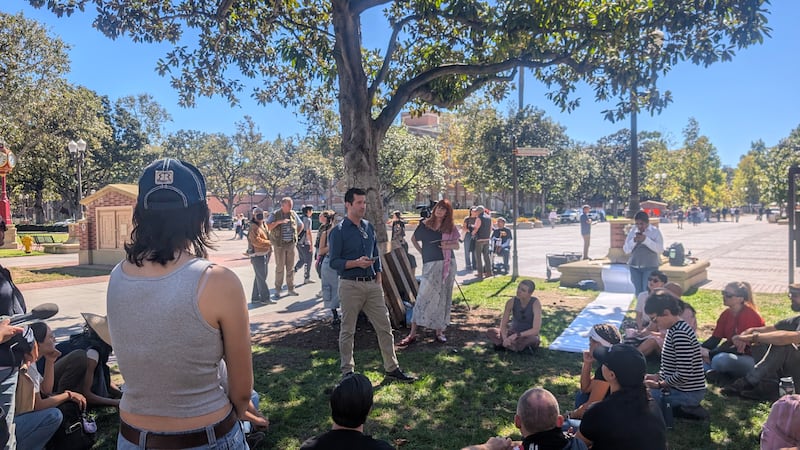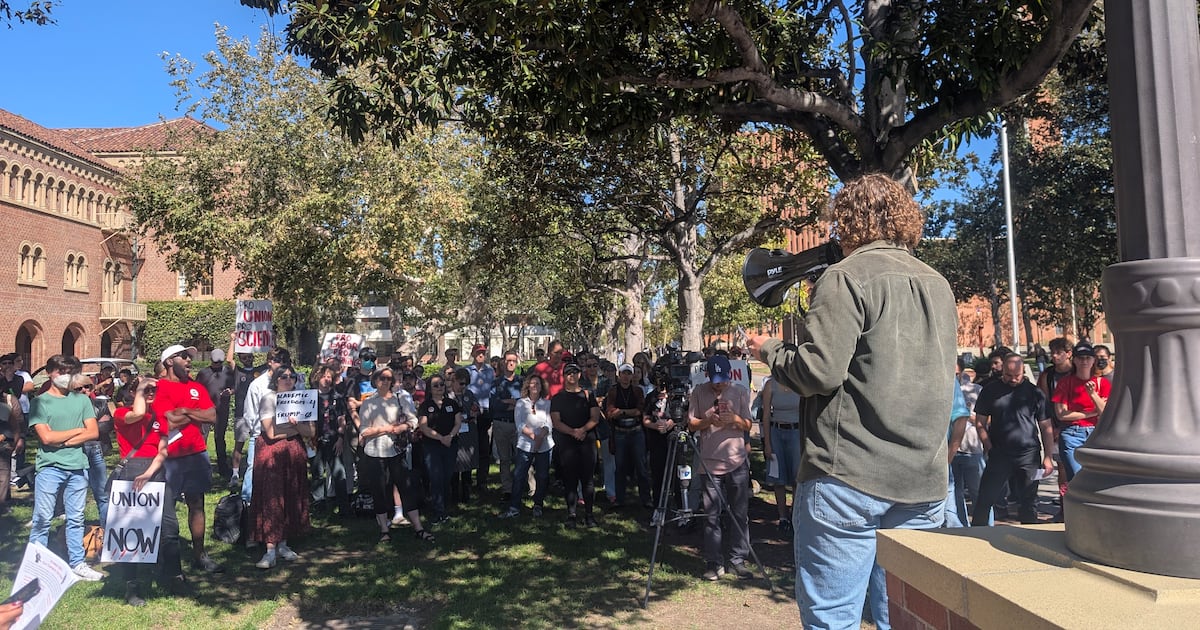Dozens of students and faculty gathered on campus near the Tommy Trojan statue on Friday to celebrate the university’s rejection of the Trump administration’s academic compact.
In a rally and teach-in organized by the USC chapter of the American Association of University Professors (AAUP), the USC Adjunct Faculty Alliance-UAW, UAW Local 872 — USC’s academic workers’ union — and USC Researchers and Fellows United (URFU-UAW), members of the community waved signs and gave speeches calling for the campus to resist the federal government’s attempts to demand changes to academic policy.
USC became the fourth university to reject the Trump administration’s offer to join its “Compact for Academic Excellence in Higher Education” agreement in an announcement on Thursday. The compact would restrict discussion on topics including transgender rights and criticism of conservative ideas and get rid of diversity-focused hiring and admission practices, among other demands, in exchange for federal funding.
The rally was initially organized as a protest by the AAUP to call for the university to reject the compact. It later took on a celebratory tone after Interim President Beong-Soo Kim rejected the compact on Thursday afternoon, when he announced the decision in a letter emailed to the USC community.
“Notwithstanding these areas of alignment, we are concerned that even though the Compact would be voluntary, tying research benefits to it would, over time, undermine the same values of free inquiry and academic excellence that the Compact seeks to promote,” Kim wrote. “Academic excellence can suffer when shifting external priorities tilt the research playing field away from free, meritocratic competition.”
Rally organizers displayed a letter asking university leaders to reject the compact, which had signatures from staff, students, faculty and alumni. (Photo by Constanza Montemayor)
Sanjay Madhav, an associate professor of practice in technology and applied computing in the Viterbi School of Engineering, spoke at the rally and said the larger USC community’s support in organizing against the compact was integral to their effort.
“I’m really thankful for the support from all the students I’ve taught over the years, and the students right now, and my colleagues and the entire campus community,” Madhav said. “This is the first time I’ve seen students, faculty, alumni, workers, everyone come together in support of a common goal that isn’t winning national championships.”
Nina Eliasoph, a sociology professor at USC Dornsife College of Letters, Arts and Sciences, said she attended the rally because she valued the power and protection of free speech. She dressed as the Statue of Liberty to protest what she felt was an attempt at government overreach on campus.
“I can’t imagine teaching in a situation where my students didn’t feel safe being able to talk,” she said.
Eliasoph said she was proud to see the university reject the compact. She came to the rally to both celebrate the university’s decision and call for the administration’s support of students and staff amid ongoing budget restructuring.
USC Dornsife announced on Oct. 10 it would lay off 162 employees, including nearly all its academic advisors. Eliasoph said she was concerned the latest layoffs would affect students in scheduling their course and graduation requirements due to a lack of advising support.
“I was incredibly relieved (about the decision), and then I thought, ‘Okay, but it’s not enough’ — we’re back to where we started, which was hundreds of staff members being laid off,” Eliasoph said.
Kyle Hulburd, the president of UAW Local 872 and a doctoral student of sociology, said he felt the rally — which was organized within hours of the university receiving Trump’s compact letter — had helped push USC to recognize the voices of its community members.
“The decision came the day before this rally — that feels like it really demonstrates that there’s a connection there, and because we sort of demonstrated that this is something we weren’t going to stand for,” he said.
Following the rally, faculty members lectured attendees about the history of the relationship between government and academic institutions in a teach-in starting just after 1 p.m. Aro Velmet, an associate professor of history and a member of the USC AAUP chapter, said the purpose of the teach-in was to explain that the compact’s impact would extend beyond higher education.
“This is not just an attack on people who study Middle Eastern politics, or on people whose gender expression is broader than what the Trump administration imagines it to be,” Velmet said. “This is an attack on the foundations of not just higher education in America, but just purely and simply democracy and free expression in America.”
 USC faculty members held a teach-in near the Tommy Trojan statue on campus following a rally to celebrate the university’s rejection of the Trump administration’s academic compact. (Photo by Aditya Thiyag)
USC faculty members held a teach-in near the Tommy Trojan statue on campus following a rally to celebrate the university’s rejection of the Trump administration’s academic compact. (Photo by Aditya Thiyag)
Velmet added that the government’s recent slew of demands on American universities could have broader implications than freedom to discuss different topics in classrooms.
“This is a five alarm fire — if you care about life saving research, if you care about free expression, if you care about diverse communities in the United States feeling safe and secure, then you should care about this.” he continued. “What this rally today has shown is that when people come together and fight together, then it is possible to resist this assault.”
Madhav stressed during the rally that he felt students and faculty needed to continue their efforts to organize.
“This isn’t the last time that Trump’s going to come and try to shake us down. So we wanted to celebrate the moment. Be happy that we have this victory, that we all came together and we have this win,” Madhav said. “But also, recognize that the fight’s ongoing. We still are going to have to fight for our academic freedom. We have to fight for the soul of the university.”
Hulburd said he hoped the rally could also work to gather support in resisting further demands by the federal government to extend control of policies in higher education, which he believed would likely continue.
“Today is about acknowledging that when we come together as workers, students, faculty, when we fight, we win,” Hulburd said. “And in this case, this is a big victory for the USC community.”

